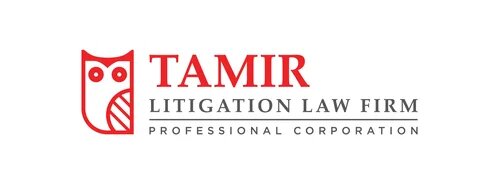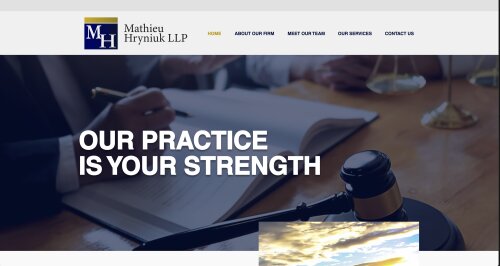Best Due Diligence Lawyers in Canada
Share your needs with us, get contacted by law firms.
Free. Takes 2 min.
Or refine your search by selecting a city:
List of the best lawyers in Canada
About Due Diligence Law in Canada
In Canada, due diligence is a fundamental concept used to ensure that individuals and organizations are taking reasonable steps to comply with the law and avoid harm. It is most commonly associated with business transactions, environmental law, and occupational health and safety regulations. The essence of due diligence is to conduct thorough investigations or steps to mitigate risks and ensure the legality and fiscal soundness of operations one might be involved in. Businesses often engage in due diligence during mergers and acquisitions to verify financials, operational practices, and legal compliance. In a broader legal context, due diligence can be a defense for individuals or corporations accused of wrongful actions if they can prove that they took all reasonable precautions to prevent such infractions.
Why You May Need a Lawyer
There are several situations where individuals or organizations may require legal assistance with due diligence matters. When involved in significant business transactions like mergers or acquisitions, lawyers ensure all legal aspects and risks are identified and addressed. Start-ups may need legal help to ensure compliance with local laws. Additionally, companies facing environmental, health, or safety audits may seek legal counsel to ascertain compliance and prepare documentation. For individuals accused of breaching regulations, a lawyer can be crucial in utilizing due diligence as a legal defense. Overall, legal expertise helps navigate complex legal requirements and safeguards from potential liabilities.
Local Laws Overview
Due diligence in Canada encompasses various legal areas influenced by both federal and provincial legislation. It includes compliance with environmental laws, occupational health and safety standards, and corporate governance regulations. The legal principle of due diligence as a defense is well recognized under Canadian law, especially concerning regulatory offenses. Proving due diligence typically requires demonstrating that appropriate systems and checks were in place to prevent the alleged offense. Notably, Canada’s Competition Act and the Canada Business Corporations Act emphasize due diligence in business operations and transactions to ensure transparency and fairness in the market.
Frequently Asked Questions
What is the purpose of due diligence?
The primary purpose of due diligence is to minimize risks by obtaining detailed information about all relevant aspects of a business or legal obligation. It ensures compliance with applicable laws and helps prevent costly legal disputes.
When is due diligence typically conducted?
Due diligence is most commonly conducted during mergers and acquisitions, prior to large investments, or when entering into contracts to ensure all potential risks are evaluated and managed effectively.
What are the key areas covered in due diligence?
Key areas typically include financial audits, legal compliance checks, market analysis, environmental assessments, and evaluation of operational practices and management teams.
How is due diligence related to corporate governance?
Due diligence is a vital component of corporate governance as it ensures that corporate activities are conducted legally and ethically, safeguarding stakeholders’ interests and enhancing accountability and transparency.
Can due diligence be used as a legal defense?
Yes, due diligence can serve as a defense in regulatory offences by showing that a person or company took all reasonable steps to prevent an infraction. While not a guaranteed defense, it can significantly impact legal outcomes.
What is environmental due diligence?
Environmental due diligence involves examining potential environmental liabilities and ensuring compliance with environmental regulations before property acquisition or major business transactions. It is essential for mitigating legal and financial risks.
Are there specific regulations covering due diligence in Canada?
Yes, various federal and provincial laws outline requirements for due diligence, including the Canada Business Corporations Act and the Competition Act, which impart obligations on companies to act responsibly and transparently.
Who typically performs due diligence?
Due diligence may involve legal advisors, financial analysts, environmental experts, and industry specialists depending on the nature of the transaction or regulatory requirement being scrutinized.
What are due diligence reports?
Due diligence reports are comprehensive documents that outline all findings from the due diligence process. They typically include details on financials, compliance, risk factors, and strategic recommendations.
How do I initiate a due diligence process?
Initiating a due diligence process involves identifying the scope of the due diligence, assembling a qualified team, gathering essential documents, and conducting thorough evaluations against legal and business standards.
Additional Resources
For more information on due diligence, one can refer to resources such as the Canadian Bar Association, local law societies, or the Government of Canada’s resources on corporate compliance and governance. These entities provide guidelines and documents to aid in understanding and implementing due diligence procedures.
Next Steps
If you need legal assistance with due diligence, the first step is to consult a lawyer specializing in the relevant field, such as corporate law or environmental law. You can start by seeking referrals from trusted business associates or searching directories like the Law Society of Canada. Once you have selected a lawyer, ensure you prepare all necessary documents and provide a detailed overview of the transaction or compliance issue at hand to facilitate a smooth review process.
Lawzana helps you find the best lawyers and law firms in Canada through a curated and pre-screened list of qualified legal professionals. Our platform offers rankings and detailed profiles of attorneys and law firms, allowing you to compare based on practice areas, including Due Diligence, experience, and client feedback.
Each profile includes a description of the firm's areas of practice, client reviews, team members and partners, year of establishment, spoken languages, office locations, contact information, social media presence, and any published articles or resources. Most firms on our platform speak English and are experienced in both local and international legal matters.
Get a quote from top-rated law firms in Canada — quickly, securely, and without unnecessary hassle.
Disclaimer:
The information provided on this page is for general informational purposes only and does not constitute legal advice. While we strive to ensure the accuracy and relevance of the content, legal information may change over time, and interpretations of the law can vary. You should always consult with a qualified legal professional for advice specific to your situation.
We disclaim all liability for actions taken or not taken based on the content of this page. If you believe any information is incorrect or outdated, please contact us, and we will review and update it where appropriate.
Browse due diligence law firms by city in Canada
Refine your search by selecting a city.













